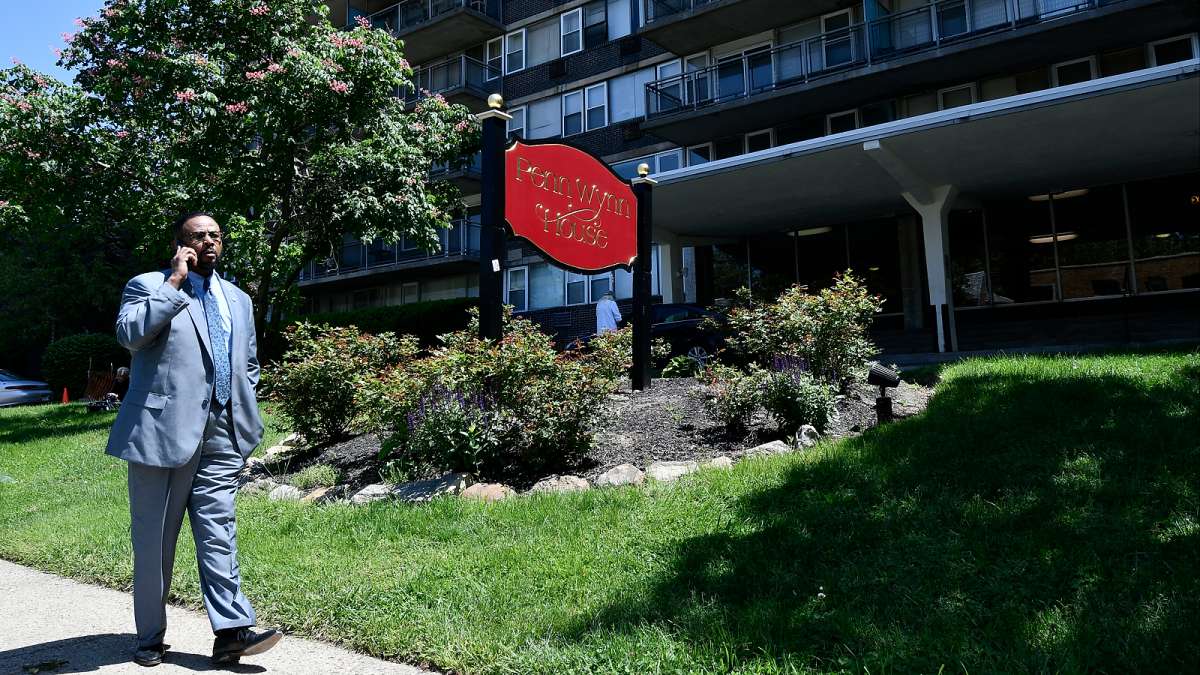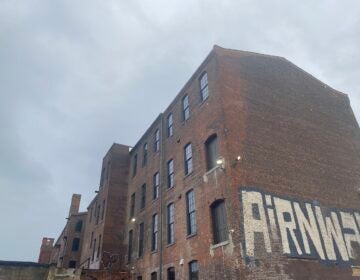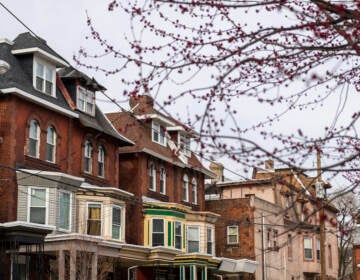Councilman Jones pushes tenant rights bill

Tomorrow is zero hour for the tenants of the Penn Wynn high rise in West Philadelphia. On June 1st, the building’s new owners, Cross Properties, are forcing them out of their homes in advance of a full-scale renovation and upscaling of the building. The property, which sits right next to SEPTA’s Wynnefield Avenue regional rail station, will soon feature a dog park, pool and a roof deck with a skyline view.
The individual tenants’ fates vary greatly. Some have found new housing since they learned of their imminent eviction in February, but many have struggled to find a new home in a city where the supply of units affordable to the average renter has been shrinking dramatically.
While Community Legal Services (CLS) is filing an injunction on behalf of a handful of the tenants, even if it succeeds it would not protect everyone in the building. At least some will be displaced.
Penn Wynn is in Councilman Curtis Jones’ 4th district, and he’s come out firmly on the side of the tenants. Jones has joined picket lines outside the building and given speeches on the floor of City Council in protest of the evictions.
Jones also promised legislation to help future tenants who end up in the same predicament. He followed through last Thursday, introducing a bill that would require property owners of multiple-occupancy buildings—defined as three or more units—to give tenants a half year’s notice before they make dramatic changes to the lease.
The bill defines a “significant lease change” as the termination of a lease—even if it is month-to-month lease or an unwritten, oral agreement—or the modification of a serious condition within the lease. Jones’s legislation covers what he calls “significant building renovation” as well, meaning work that requires a building permit and affects at least a quarter of the residential units in a building.
Jones says his legislation is a direct result of the Penn Wynn evictions, along with fears about the future for the Philadelphia’s renters.
“Investors came in to renovate the property for people who could pay more and very little concern was given to those people who have been living there,” said Jones. “As one isolated incident, this would be bad enough, but we are seeing that Philadelphia is being discovery as an undervalued real estate market. It’s a trend.”
The legislation would expand the current law, which currently only covers condos and co-ops. The bill would also increase penalties from $300 per violation to $2,000 per violation, plus the city’s legal expenses.
Jones initially promised legislation to deal with future Penn Wynn-like occurrences on a resident picket line organized by the Philadelphia Tenants Union. The councilman cites the group as an inspiration for the legislation and said that he met with them to discuss it before introducing the bill last week.
Jones also consulted Penn Wynn tenants’ lawyer from CLS, Rasheedah Phillips.
Phillips said mass evictions from multi-family buildings aren’t common in Philadelphia. But it does happen more frequently in hot market cities like San Francisco and Washington D.C.
“This is very narrowly focused on things arising from this Penn Wynn issue,” says Phillips. “I think it has some foresight into what we may start seeing more and more of if we don’t deal with it and find ways to protect tenants from these types of situations.”
The Pennsylvania Apartment Association East (PAA East) is less sanguine about the bill. The group is well aware that the situation at Penn Wynn is the reason for the legislation, but they are not convinced that similar situations are widespread in Philadelphia.
PAA East’s government affairs director, Christine Young-Gertz, calls for a detailed analysis of the extent of the problem. For now, she says the group cannot support the legislation in its current form.
“Honestly, I don’t know if this is a big problem or if that situation was just an aberration,” says Young-Gertz. “You have to be really careful and thoughtful when you do legislation. To say the bill needs work is certainly an understatement, although we agree people shouldn’t be turned out on the street.”
Jones says that he hopes to schedule a hearing on the bill before City Council’s summer break. He is confident that he can find the necessary nine votes and that it can be passed in the autumn.
This may be just the beginning of City Council’s efforts to address tenant rights and Philadelphia’s eviction epidemic. Earlier this year Councilwoman Helen Gym held hearings about housing conditions and the power imbalances in the city’s landlord-tenant court.
Jones says that his bill is “a good start,” and that he is interested in further protections—although he emphasizes that he doesn’t want to do anything extreme that would scare investors away from the city.
The Philadelphia Tenants Union also expressed support for the legislation, although they saw it as a step towards “Just Cause” anti-eviction legislation. Under a “Just Cause” law, landlords would be prohibited from kicking out tenants unless they committed an infraction like actively harming the property or not paying rent. Many landlords oppose just cause eviction laws, saying they scare off would-be apartment builders like them and make it too difficult to evict bad tenants.
“This is only a step towards what we want to do,” said Klyde Breitton, president of the Philadelphia Tenants Union. “This won’t stop evictions from happening in the first place, it’ll only delay them. We’ll be pushing city council members to go past this, but it’s a good first step.”
WHYY is your source for fact-based, in-depth journalism and information. As a nonprofit organization, we rely on financial support from readers like you. Please give today.







